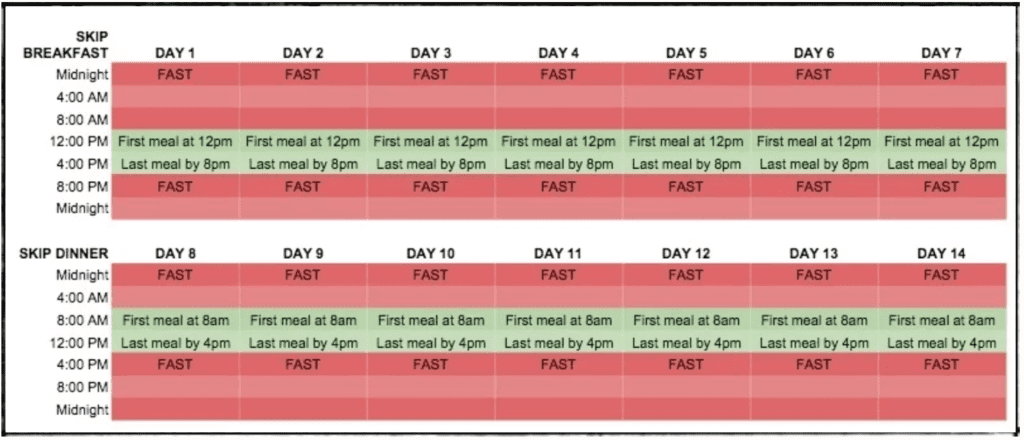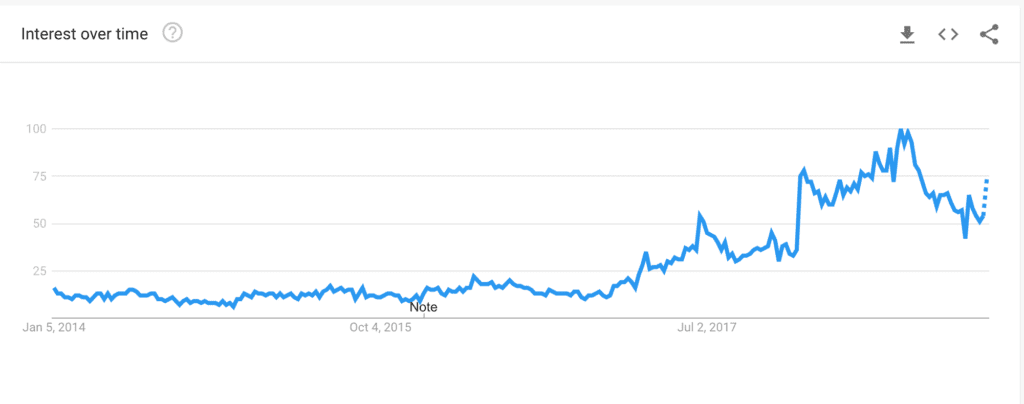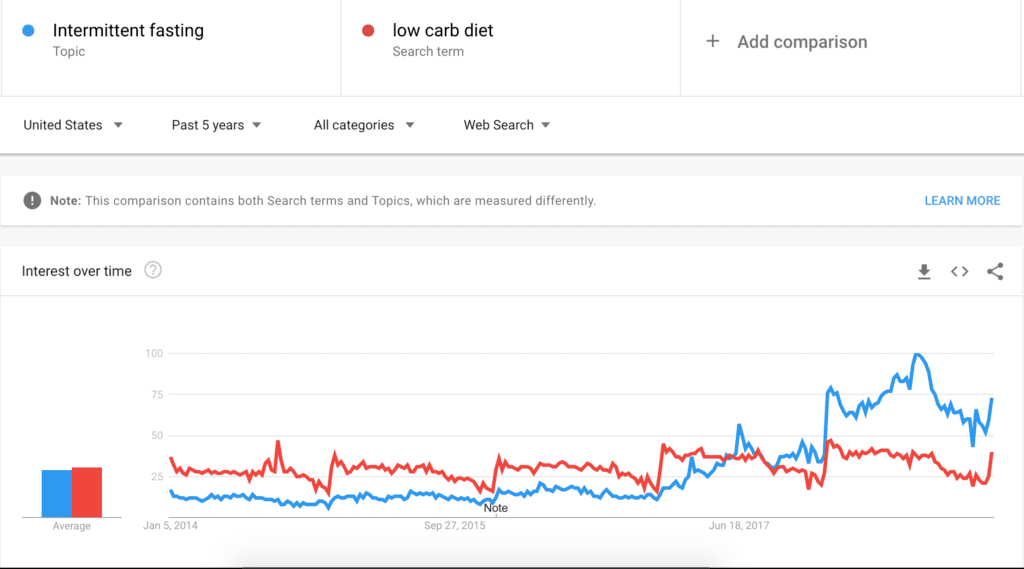It seems like everywhere you look these days new diet trends and fads are showing up. Just to name a few: Paleo Diet, Keto Diet, Low-Carb Diet, and Intermittent Fasting. Sound familiar? Of course, they do. These are topics that you have seen on social media, on blogs, articles, advertisements, and basically anywhere that you have access to information. One of the newer topics is intermittent fasting. Intermittent fasting has become increasingly popular in just the last year . This topic has been surfacing in articles, on social media, and even many fitness influencers are talking about the craze. But is this a topic that is here to stay or is it just another trend? Just like with any other trend, it is important to do research and see if this trend is beneficial. As a supplement manufacturer, we like to stay up-to-date on how these trends affect our own industry. We have done some research and will be diving into the topic of intermittent fasting in this article.
Reference Link: https://16-8diet.com/
Intermittent Fasting… What is it?
Intermittent fasting is an eating pattern that focuses on when one should eat rather than what foods one should eat. The word “fasting” means to abstain from consuming food, drink, or both for a period of time. The intermittent fasting schedule involves 16-hour daily fasts or fasting periods of 24 hours. It is used as an effective weight loss technique due to the possibility it has to increase fat oxidation, reduce body weight, and increase fat loss. Often, people misunderstand the process of intermittent fasting and assume that it is in correlation with starvation. However, fasting differs from starvation in one very important way: control. Starvation is neither deliberate or controlled, as it is the involuntary absence of food. Whereas, fasting is the voluntary withholding of food for many reasons including health and/or spiritual reasons.
An intermittent fasting diet plan example could be when a person stops eating before they go to bed and start eating again with a late breakfast around 11am the next day. This is something most people will do anyway and don’t even realize that they are fasting. People who achieve successful weight-loss through this type of fasting consume less calories when they are fasting. It can be challenging though, because some people get hungry during their fasting hours, end up not controlling their calorie intake and end up overeating. The period after a fast is known as the “eating window” or the “non-fasting” period. This is the period after fasting has been complete and it is now time to consume calories.
The chart below shows a 14 day schedule for an intermittent fasting meal plan. As the chart shows, the green area of the chart is the non-fasting period in which one is free to partake in meals.

(Source: Nerd Fitness)
There are various positive results of intermittent fasting. One of the results is weight loss and a decrease of body fat. This is the results of a very successful intermittent fasting plan, which is very challenging to complete. Another positive benefit is that there is no calorie counting and no change in diet during the non-fasting period. This allows flexibility because foods that one consumes during this period can be ones they still enjoy (within reason). Which makes this a very simple eating pattern that for some, can be easy to follow along with. An intermittent fasting 16/8 schedule (16 hours fasting and 8 hours of non-fasting), is also said to help improve blood sugar control, improve overall brain function, and help increase longevity. When paired with a healthy and active lifestyle, this type of diet may work for those who really do their research and find that this will work for them.
While this sounds like an easy diet to help you lose weight effectively, there are also many downsides to the intermittent fasting diet. Although different from starvation, intermittent fasting for weight loss could potentially lead to eating disorders. Being that the body goes long periods without eating, the non-fasting and eating window could cause someone to overeat and binge. Binge eating during the non-fasting period could cause guilt and shame and lead to further problems such as eating disorders, depression, and other emotional and mental issues. Another downside is that intermittent fasting for women results may cause more harm than good. Studies have shown that for women, fasting can lower glucose tolerance and negatively affect metabolism. An intermittent fasting weight loss plan for women can trigger hormonal issues such as irregular periods and can cause anxiety and insomnia. Intermittent fasting can result in a lower insulin intake which can be very harmful and dangerous for those who are diabetic. With so many negatives, it is very important to consult a healthcare professional before beginning this diet, as it may not be the best option for everyone.
Recent Intermittent Fasting Diet Trends
In a quick Google Trends search, it is easy to see how the topic of intermittent fasting has increased in popularity over the past few years. The searches of this topic have significantly increased within the last year. The chart below shows how searches of in 2014 compared to more recent searches.

(Source: Google Trends)
The chart below shows a search of “Intermittent Fasting” compared to searches of “Low-Carb Diet” in the past few years. According to the chart, intermittent fasting has been searched more recently than low-carb diet. This example clearly shows how intermittent fasting has become a trendy topic.

(Source: Google Trends)
Intermittent Fasting & Taking Supplements
Any supplement that has any macronutrients in it, such as protein, carbohydrates, sugar, etc., will break the fasting period. Macronutrients have calories and therefore breaks the fasting period. This will affect the intermittent fasting results in a negative way and will prevent the body from achieving the goal of losing weight or burning body fat. This would include supplements such as meal replacements, any product with protein as the base, whether vegan or not. Creatine mono-hydrate, by itself, with no additives, unflavored, etc can affect insulin responses. It may or may not break the fasting period, however, each person is different and it may not effect the fasting period. It is important to note that it could break the fasting period and may be better to consume creatine closer to the eating window. BCCAs, Branch Chain Amino Acids, typically do not have calories listed on the label. However, it is important to note that BCAAs can be metabolized and used for energy, therefore it does have a small amount of calories. This means that consuming a BCAAs product will break the fasting period. In summary, it is better to avoid supplements during the intermittent fasting phase. However, during the eating window, supplements are perfectly safe to consume. If one has consumed the appropriate amount of fasting hours, then the non-fasting window is the only time that consuming supplements will not negatively affect the purpose of the fast.
How Does Intermittent Fasting Affect The Supplement Industry?
As a supplement manufacturer or supplement distributor, it is important to note that most will not be consuming products throughout the fasting period. Initially, this may bring a wave of concern over the idea that supplements aren’t needed for someone that is participating in intermittent fasting. While this is true to a certain extent, it is important to note that those on the intermittent fasting phase will be consuming supplements during their eating window. This does not mean that supplements will be nonexistent for one who is intermittent fasting, it just means they will be consuming less. Since the non-fasting period is still a period where the consumer is being healthy, supplements will still be a vital part of this person’s diet routine. The only downsides to intermittent fasting in the supplement industry is that there is no demand for new products for this trend, as the non-fasting window allows the normal daily supplements to be consumed. Do not panic just yet. The intermittent fasting trend will not put your supplements out of business.
Marissa Spade
Marissa graduated from Robert Morris University in May 2018 with a Bachelor of Science in Marketing. She started her career with SDC Nutrition as an intern during her college years and under the guidance of the co-founder Devenee Schumacher she has been an integral part of the Digital and Social Marketing presence for the company.
Internally she claims the token “Millennial” role of the team, but she is involved in every aspect of the digital face of the company from copy writing, public relations, affiliate management, ambassador management, and content creation. Since becoming a full-time member of the team she has most notably launched over 100 published articles for the company and its brands & she has successfully on-boarded over 500 affiliates in the company’s innovative Affiliate program.
Spade is set to launch new innovative content for all of the brand profiles which she is solely responsible for this year and her upcoming national campaigns are set to exponentially increase the overall audience for the company. Stay tuned for her upcoming accomplishments… you won’t want to miss the updates!
